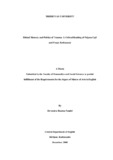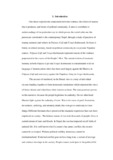Please use this identifier to cite or link to this item:
https://elibrary.tucl.edu.np/handle/123456789/3385Full metadata record
| DC Field | Value | Language |
|---|---|---|
| dc.contributor.author | Paudel, Devendra Sharma | - |
| dc.date.accessioned | 2021-07-23T10:01:15Z | - |
| dc.date.available | 2021-07-23T10:01:15Z | - |
| dc.date.issued | 2008 | - |
| dc.identifier.uri | http://elibrary.tucl.edu.np/handle/123456789/3385 | - |
| dc.description.abstract | This thesis analyses the cultural politicsofmemoryand trauma in Narayan Wagle'sPalpasa Caféand Manjushree Thapa’sForget Kathmandu.My argument is that Wagle and Thapa's memory of war is contaminated by the cultural ideologies. Their memory, thus, takes an ethical turn and becomes a part of the larger ideological politics. Theirnarrativazion of trauma–contaminatedby ideologyuses the language of demonization. The thesis argues that writer's authorities,editing and sensorship practices ultimately lead their literature of trauma that narrativizationto traumatic memory.Wagle uses largely against the Maoists inPalpasa Caféwhile Thapa does the same against the Napalese Army in Forget Kathmandu. | en_US |
| dc.language.iso | en_US | en_US |
| dc.subject | Trauma | en_US |
| dc.subject | Politics | en_US |
| dc.subject | Palpasa Café | en_US |
| dc.title | Ethical Memory and Politics of Trauma: A Critical Reading of Palpasa Café and Forget Kathmandu | en_US |
| dc.type | Thesis | en_US |
| local.institute.title | Central Department of English | en_US |
| local.academic.level | Masters | en_US |
| Appears in Collections: | English | |
Files in This Item:
| File | Description | Size | Format | |
|---|---|---|---|---|
| cover.pdf | 13.96 kB | Adobe PDF |  View/Open | |
| chapter.pdf | 125.58 kB | Adobe PDF |  View/Open |
Items in DSpace are protected by copyright, with all rights reserved, unless otherwise indicated.
